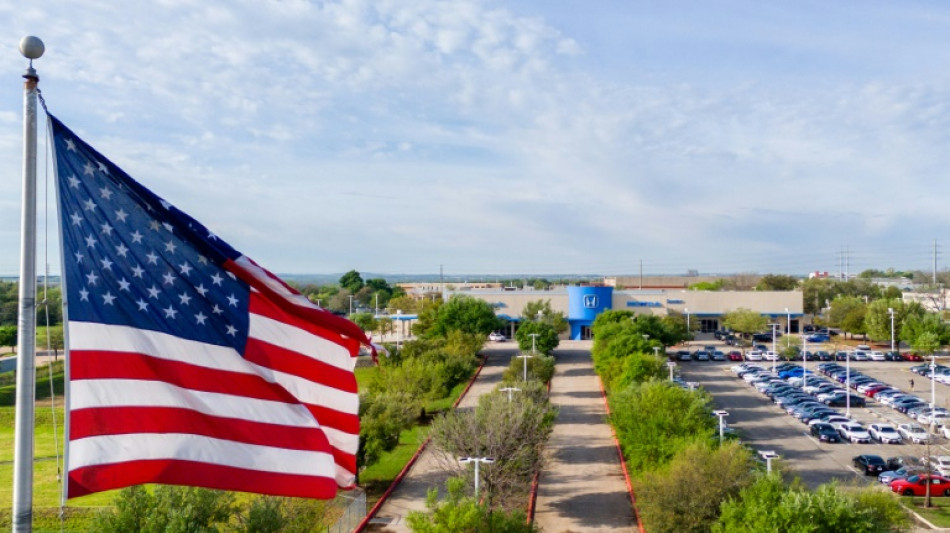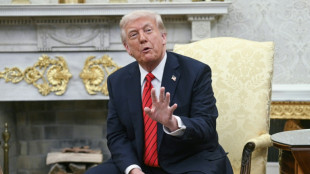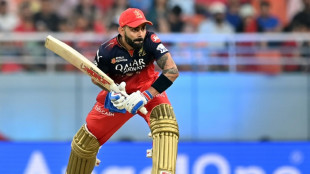
-
 Maresca leaves celebrations to players after Chelsea sink Fulham
Maresca leaves celebrations to players after Chelsea sink Fulham
-
Trump eyes gutting US diplomacy in Africa, cutting soft power: draft plan

-
 Turkey bans elective C-sections at private medical centres
Turkey bans elective C-sections at private medical centres
-
Lebanon army says 3 troops killed in munitions blast in south

-
 N.America moviegoers embrace 'Sinners' on Easter weekend
N.America moviegoers embrace 'Sinners' on Easter weekend
-
Man Utd 'lack a lot' admits Amorim after Wolves loss

-
 Arteta hopes Arsenal star Saka will be fit to face PSG
Arteta hopes Arsenal star Saka will be fit to face PSG
-
Ukrainian troops celebrate Easter as blasts punctuate Putin's truce

-
 Rune defeats Alcaraz to win Barcelona Open
Rune defeats Alcaraz to win Barcelona Open
-
Outsider Skjelmose in Amstel Gold heist ahead of Pogacar and Evenepoel

-
 Arsenal make Liverpool wait for title party, Chelsea beat Fulham
Arsenal make Liverpool wait for title party, Chelsea beat Fulham
-
Trump slams 'weak' judges as deportation row intensifies

-
 Arsenal stroll makes Liverpool wait for title as Ipswich face relegation
Arsenal stroll makes Liverpool wait for title as Ipswich face relegation
-
Sabalenka to face Ostapenko in Stuttgart final

-
 Kohli, Padikkal guide Bengaluru to revenge win over Punjab
Kohli, Padikkal guide Bengaluru to revenge win over Punjab
-
US aid cuts strain response to health crises worldwide: WHO

-
 Birthday boy Zverev roars back to form with Munich win
Birthday boy Zverev roars back to form with Munich win
-
Ostapenko eases past Alexandrova into Stuttgart final

-
 Zimbabwe on top in first Test after Bangladesh out for 191
Zimbabwe on top in first Test after Bangladesh out for 191
-
De Bruyne 'surprised' over Man City exit

-
 Frail Pope Francis takes to popemobile to greet Easter crowd
Frail Pope Francis takes to popemobile to greet Easter crowd
-
Lewandowski injury confirmed in blow to Barca quadruple bid

-
 Russia and Ukraine accuse each other of breaching Easter truce
Russia and Ukraine accuse each other of breaching Easter truce
-
Zimbabwe bowl Bangladesh out for 191 in first Test in Sylhet

-
 Ukrainians voice scepticism on Easter truce
Ukrainians voice scepticism on Easter truce
-
Pope wishes 'Happy Easter' to faithful in appearance at St Peter's Square

-
 Sri Lanka police probe photo of Buddha tooth relic
Sri Lanka police probe photo of Buddha tooth relic
-
Home hero Wu wows Shanghai crowds by charging to China Open win

-
 Less Soviet, more inspiring: Kyrgyzstan seeks new anthem
Less Soviet, more inspiring: Kyrgyzstan seeks new anthem
-
Defending champion Kyren Wilson crashes out in first round of World Snooker Championship

-
 NASA's oldest active astronaut returns to Earth on 70th birthday
NASA's oldest active astronaut returns to Earth on 70th birthday
-
Exec linked to Bangkok building collapse arrested

-
 Zelensky says Russian attacks ongoing despite Putin's Easter truce
Zelensky says Russian attacks ongoing despite Putin's Easter truce
-
Vaibhav Suryavanshi: the 14-year-old whose IPL dream came true

-
 Six drowning deaths as huge waves hit Australian coast
Six drowning deaths as huge waves hit Australian coast
-
Ukrainian soldiers' lovers kept waiting as war drags on

-
 T'Wolves dominate Lakers, Nuggets edge Clippers as NBA playoffs start
T'Wolves dominate Lakers, Nuggets edge Clippers as NBA playoffs start
-
Taxes on super rich and tech giants stall under Trump

-
 Star Wars series 'Andor' back for final season
Star Wars series 'Andor' back for final season
-
Neighbours improvise first aid for wounded in besieged Sudan city

-
 Tariffs could lift Boeing and Airbus plane prices even higher
Tariffs could lift Boeing and Airbus plane prices even higher
-
Analysts warn US could be handing chip market to China

-
 Unbeaten Miami edge Columbus in front of big MLS crowd in Cleveland
Unbeaten Miami edge Columbus in front of big MLS crowd in Cleveland
-
Social media helps fuel growing 'sex tourism' in Japan

-
 'Pandora's box': alarm bells in Indonesia over rising military role
'Pandora's box': alarm bells in Indonesia over rising military role
-
Alaalatoa hails 'hustling hard' Brumbies for rare Super Rugby clean sheet

-
 Trio share lead at tight LA Championship
Trio share lead at tight LA Championship
-
Sampdoria fighting relegation disaster as old heroes ride into town

-
 Recovering pope expected to delight crowds at Easter Sunday mass
Recovering pope expected to delight crowds at Easter Sunday mass
-
Nuggets edge Clippers in NBA playoff overtime thriller, Knicks and Pacers win


US auto industry stunned by tariffs meant to save it
The 25 percent tariffs on automobiles announced by President Donald Trump are meant to revitalize American industry, but Detroit's giants were stunned Thursday by their scale and faced a beating on Wall Street.
While the implementation of the tariffs had been anticipated for weeks, their details surprised manufacturers and experts as the levies will not only apply to imports of finished vehicles but parts as well.
That will be particularly painful because the sector relies on a complex global supply chain, sometimes involving multiple border crossings, with assembly in one country of parts manufactured in others.
The levies kick in April 3 at 04:01 GMT, according to the decree signed by the Republican president on Wednesday.
The manufacturing process at Ford and General Motors depends largely on a highly complex back-and-forth between the United States, Mexico, and Canada -- the three countries linked by the USMCA, a free trade agreement signed by Trump during his first term.
However, Trump's decree doesn't provide exemptions for imports under USMCA, dashing industry hopes that car parts would be spared.
The tariffs include "crucial parts" -- engines, transmissions, powertrains, and electrical components are on the list that could be expanded.
Parts not originally manufactured in the United States will face 25 percent tariffs just like finished foreign vehicles.
The White House noted that of the 16 million new vehicles sold in the United States last year, half were assembled in the country but contained only 40-50 percent American-made components.
It also said the trade deficit for automotive parts was $93.5 billion.
Stock Market Decline
Manufacturers faced a drubbing in the stock market Thursday.
General Motors plummeted 7.3 percent, while Ford closed down 3.8 percent and Stellantis 1.2 percent.
US listed shares of Toyota and Honda fell by 2.8 percent and 2.7 percent, respectively.
According to JPMorgan analysts, 82 percent of vehicles sold by Ford are produced in the United States, ahead of Stellantis (71 percent), Honda (68 percent), Toyota (57 percent), and General Motors (53 percent).
Trump's decree demands that manufacturers determine the percentage between US parts and foreign parts in components or finished vehicles entering the United States, with the 25 percent tariff imposed only on foreign-made parts.
This presents a real challenge for manufacturers -- who will be penalized for incorrect allocations -- but also for the authorities to track them.
An implementation delay has therefore been granted, allowing the Commerce Department time to figure out how to proceed.
According to JPMorgan, once tariffs are collected across the entire intended scope, they would generate $82 billion annually.
Trump claimed Wednesday that they would bring in "more than $100 billion."
JPMorgan estimated that the largest tariff bill would be paid by GM ($13 billion) while Ford should pay around $4.5 billion.
Experts have no doubt that there will be a price increase for new vehicles in the United States, which will subsequently affect a weakened used car market as owners keep their vehicles longer.
The president's goal is to increase manufacturing in the United States, but relocating factories or reconfiguring a supply chain cannot happen overnight.
Foreign nations have also threatened retaliatory measures which could further impact the sector.
In the meantime, manufacturers will have to decide between fully passing on the additional cost to the end consumer, cutting into their margins, or a mix of both.
The cost of an affected new vehicle could increase by 9-12 percent, or $4,000 to $5,300, JPMorgan anticipates.
"With added cost pressures, automakers may pull back on incentives, which could make it more difficult for some consumers to find affordable options," said Jessica Caldwell from Edmunds.
According to Caldwell, insurance premiums should also increase due to inflation in spare parts costs.
D.Kaufman--AMWN

